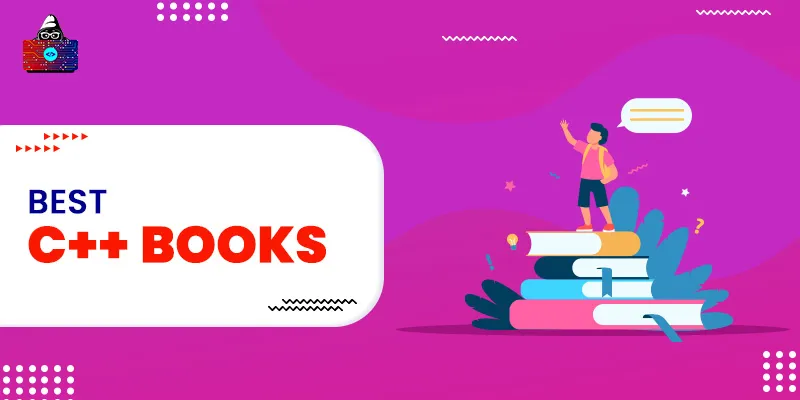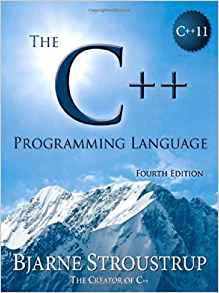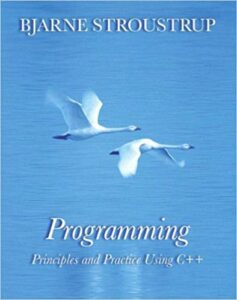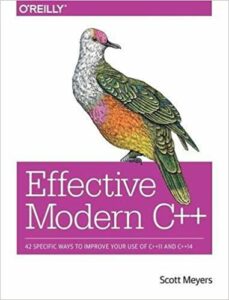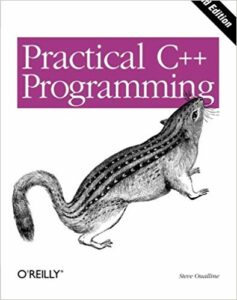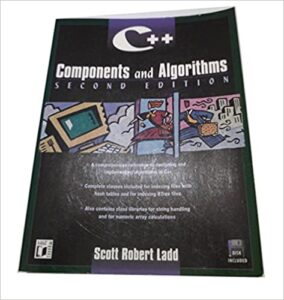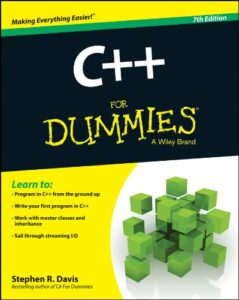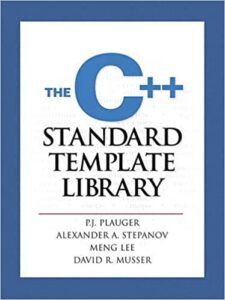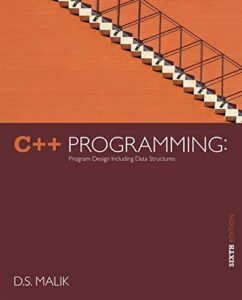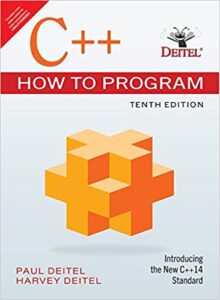These 10 C++ books will help you champion the C++ concepts and make you a better programmer.
C++ is one of the most dominating and versatile programming languages. It’s pretty old, appearing for the first time in 1985, yet programmers prefer it to the built desktop applications due to its code hiding privilege and mobility.
Originally, C++ was introduced as the successor of C, with the concept of OOPs and graphics, which made it famous back in the 2000s. However, the C++ craze hasn’t ended yet.
Many giant companies leverage C++ to make their applications, such as Google. Chrome is one of its significant achievements. It is developed in C++.
Here we will be discussing the best C++ books. You can learn C++ from institutions and online courses, but nothing can replace the significance of books since nothing is better than self-study.
A book lets you read the concepts and then learn by practice. They also act as references when you're stuck somewhere.
10 Best C++ Books for Beginners to Advanced Programmers
There are lots of books on C++ in the market, which, although a good thing, can also be confusing. Choosing the best book(s) can be infuriating because, on the top, they all look the same, frankly, due to the shared jargon.
But here we have the top 10 recommended books that can help you in your journey of learning C++ efficiently.
1. The C++ Programming Language (Fourth Edition)
Author: Bjarne Stroustrup
For: Beginner-level and intermediate-level programmers.
It is written by none other than Bjarne Stroustrup, the creator of C++, and who else to know better C++ than him? The C++ Programming Language is an immensely popular and hands-on guide on the subject.
This C++ book is a great deal as it contains all the basics of C++, along with the advanced-level concepts. The author has completely revised the book and published the fourth edition, which helps programmers learn to write faster and more efficient code that complies with the C++ 11 standard.
He has explained pure C++ 11 examples throughout the book. This book covers the following topics:
- Basic facilities, such as objects, storage, computational fundamentals, type, scope, and so on.
- C++ abstraction, object-oriented programming , and functional programming .
- The basic memory model of C++.
- Modularity, as supported by namespaces, exception handling, and source files.
- Other topics such as string, libraries, utilities, iterators, containers, algorithms, numerics, stream I/O, and many others.
About the Author
Bjarne Stroustrup is the original implementor and designer of the C++ language. He has written many books on C++ and many other academic publications. Also, he is the University Distinguished Professor at Texas A&M University. He is an ACM fellow, an IEEE Fellow, and a member of the U.S. National Academy of Engineering.
Publisher:
Pearson Addison-Wesley Professional
Paperback Print Length:
1376 pages
You can buy this book from here .
2. Programming: Principles and Practice Using C++
Author: Bjarne Stroustrup
For: Beginner and intermediate programmers
Another great book written by the creator of C++ is Programming: Principles and Practice Using C++. In this book, Stroustrup has introduced fundamental concepts of C++ in-depth, which will help programmers write clean, maintainable, and efficient C++ code.
This book is a definitive guide for those who have never programmed or are new to programming. Moreover, many universities have included this book in their curricula for first-year students.
The book's first half introduces readers to basic concepts, like programming techniques and language features. The second half covers advanced C++ topics, like text processing, testing, etc. The C++ book walks you through:
- An in-depth introduction to C++ programming.
- Object-oriented programming and generic programming.
- Modern C++ programming techniques.
- The C++ standard library.
- Features of C++ 11 and C++ 14.
Publisher:
Addison-Wesley
Paperback Print Length:
1312 pages
You can buy this book from here .
3. C++ Primer (Fifth Edition)
Author:
Josée Lajoie, Stanley B. Lippman, and Barbara E. Moo
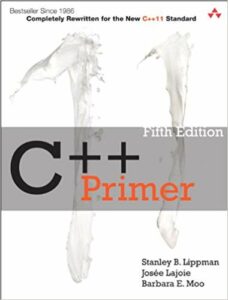
For: Beginners, intermediates, and professionals
If you have no experience with C++ or any other programming language, the C++ Primer 5th edition is one of the best C++ books to help you learn C++ from scratch.
In this book, the authors have highlighted modern C++ programming techniques. Moreover, they introduced how to use code language and its standard library to write clean and efficient code.
The fifth edition of C++ Primer is fully updated and revised for the C++ 11 standard. This book is a perfect blend for beginners and experienced programmers because it explores C++ concepts and techniques, along with hundreds of examples.
This book will help you learn the following:
- How to use the C++ 11 language features and the standard library to develop efficient C++ code.
- Modern program design techniques and best coding styles through hundreds of examples.
Moreover, it covers up-to-date learning aids and exercises that help you avoid pitfalls and promote good practices.
About the Author
Stanley B. Lippman worked as a Distinguished Consultant for the Jet Propulsion Laboratory and as an architect of Visual C++ development at Microsoft. Also, he was a member of the technical staff at Bells Laboratory.
Josée Lajoie, a former member of IBM Canada's C/C++ development team, works at Pixar. He was the chairperson of the core language working group for the ANSI/ISO C++ standardization committee.
Barbara E. Moo has over thirty years of experience in software development. She worked closely with the designer of C++, Bjarne Stroustrup, at AT&T.
Publisher:
Addison-Wesley
Paperback Print Length:
976 pages
You can buy this book from here .
4. Effective Modern C++
Author: Scott Meyers
For: Advanced-level programmers
Effective Modern C++: 42 Specific Ways to Improve Your Use of C++11 and C++14 is a definitive guide to learning modern programming strategies to improve the use of C++ 11 and C++ 14. This book covers the features of C++ 11 and C++14, including auto-type declarations, lambda expression, concurrency support, and move semantics.
Moreover, you will learn how to use these aforementioned features effectively to develop effective, maintainable, and portable C++ code. This book is ideal for advanced-level programmers. It helps them learn how to write fully-functional software using modern C++, i.e., C++11 and C++14.
Through this book, you will learn:
- Techniques for writing clean and maintainable lambda expressions.
- The benefits and drawbacks of perfect forwarding, smart pointer make functions, noexcept specifications, and braced initialization.
- The difference between std::atomic and volatile, how to use them, and their relation with C++'s concurrency API.
- Relationships among rvalue references, std::move, universal references, and std::forward.
After reading this book, you will get to know why and how the best practices in 'old' C++, i.e., C++98, require revision.
About the Author
Scott Meyers is a trainer, consultant, and conference presenter. He holds a Ph.D. in computer science and is a winner of the 2009 Dr. Dobb’s Excellence in Programming Award.
Publisher:
O'Reilly
Paperback Print Length:
336 pages
You can buy this book from here .
5. Practical C++ Programming (Second Edition)
Author: Steve Oualline
For: Beginner and intermediate programmers
Practical C++ Programming is an idea for those on their journey to learn and master C++. The book's second edition highlights all the significant revisions made to C++. It primarily focuses on helping you to write elegant and clean C++ code.
This book covers all the aspects of C++ programming, including programming design, object-oriented design, debugging, style, and software engineering.
By the successful completion of this book, you will have developed a firm grasp of C++ programming skills.
This book thoroughly covers the following C++ concepts:
- C++ syntax .
- C++ coding standards and style.
- Creation and use of object classes.
- Debugging and optimization.
- File input/output.
- Templates.
- Use of the C++ preprocessor.
The author of this book has included many practice questions that you can try by yourself and understand how the theoretical concepts are implemented in real-world scenarios.
About the Author
Steve Oualline is a software engineer at a major phone company in Southern California.
Publisher:
O'Reilly Media
Paperback Print Length:
600 pages
You can buy this book from here .
6. C++ Components and Algorithms
Author: Scott Robert Ladd
For: Advanced-level programmers
C++ Components and Algorithms is a definitive guide for advanced-level C++ programmers. This book intends to provide readers with in-depth knowledge of under-documented C++ concepts in commercial compiler manuals.
Moreover, it comes with a disk containing all code from the book, which is an added advantage for programmers. This book also includes reusable libraries compatible with the latest versions of C++ compilers for everyday data-handling tasks.
You can also find a comprehensive class library for BTree-indexed files, including searching, insertion, and deletion. In addition, it includes various templates that enable single functions to handle multiple data types.
About the Author
Scott Robert Ladd is a fantasy and science fiction author. He has written dozens of books on computer programming since the 1990s.
Publisher:
Hungry Minds Inc, U.S.
Paperback Print Length:
800 pages
You can buy this book from here .
7. C++ for Dummies (Seventh Edition)
Author: Stephen R. Davis
For: Beginners and Intermediate-level programmers
The seventh edition of C++ for Dummies is a revised and updated edition that reflects modern C++ standards and focuses on big data. It highlights the use of C++ among popular big data solutions.
This C++ book follows step-by-step instructions, helping beginners become programmers, and intermediate-level programmers hone their C++ expertise. Immediately after completing the first chapter of this book, you will have your first C++ application.
The C++ book is a perfect guide for those new to programming, skilled in other programming languages, and who want to gain clarity on C++ libraries , features, and generics.
This book provides:
- A thorough introduction to the C++ programming language.
- An in-depth understanding of programming strategies for writing effective and bug-free C++ code.
- Information on classes, inheritance, and optional features.
- Introduction to how to use a copy constructor.
About the Author
Stephen R. Davis has over 30 years of experience in the programming field and is a best-selling author of various books and articles.
Publisher:
Wiley
Paperback Print Length:
480 pages
You can buy this book from here .
8. The C++ Standard Template Library
Author: P.J. Plauger, Alexander Stepanov, Meng Lee, David Musser
For: Advanced-level programmers
This book is a perfect guide for C++ developers that assists them in maximizing productivity and enhancing software quality while boosting performance simultaneously. It provides basic container classes, fundamental algorithms, and a clean, efficient, and elegant framework for C++ development.
The authors have described each C++ Standard Template Library component in a single chapter, its background, techniques to use that component, and hands-on exercises.
This book covers the following topics:
- Introduction to the Standard Template Library (STL)
- Guidelines for using STL features and test code
- Programming exercises
- Utility templates
- Allocators and memory templates
- Lists and linked lists
- Double-ended queues
- Numeric templates
About the Author
P.J. Plauger is the President of Dinkumware, Ltd. He has been a contributing editor to Embedded Systems Programming and a senior editor of The C/C++ Users Journal for many years.
Alex Stepanov was the head of the Generic Programming Project at Hewlett-Packard Research Laboratories and currently works at AT&T.
Meng Lee is a technical contributor at Hewlett-Packard Research Laboratories .
David R. Musser specializes in research on generic programming. He is a professor of computer science at Rensselaer Polytechnic Institute.
Publisher:
Pearson
Paperback Print Length:
512 pages
You can buy this book from here .
9. C++ Programming: Program Design Including Data Structure (Seventh Edition)
Author: D.S. Malik
For: Advanced-level programmers
The seventh edition of C++ Programming is the definitive guide for the CS1/CS2 course sequence. The author has used the student-centered and time-tested methodology to describe the C++ program design and data structure concepts . He focused on providing full-code examples in this book that help readers know how and why to apply the programming concepts to solve a particular problem.
Also, the new edition of C++ Programming consists of exercises at the end of each chapter. Moreover, it walks you through C++ variables and user-defined functions at the beginning. You will also explore debugging exercises.
This C++ book ensures that the readers learn how to apply C++ programming and gain a thorough understanding of all C++ concepts.
About the Author
D.S. Malik is a professor of Mathematics and has received Ph.D. from Ohio University. He is the first receiver and the current holder of The Frederick H. and Anna K. Scheerer Endowed Chair in Mathematics.
Publisher:
Wadsworth Publishing Co Inc.
Paperback Print Length:
1,616 pages
You can buy this book from here .
10. C++ How to Program (Tenth Edition)
Author: Paul Deitel and Harvey Deitel
For: Beginner and Intermediate-level programmers
The tenth edition of C++ How to Program walks you through a thorough introduction to C++ 11 and C++ 14 programming. Also, it provides a comprehensive set of fully coded programs, along with their explanations.
Through this book, you will get familiar with the following typical C++ topics:
- Input/Output and operators in C++.
- Introduction to classes, objects, member functions, and strings.
- Algorithm development.
- Control statements.
- Functions and recursion.
- Pointers.
- Operator overloading.
- Object-oriented concepts.
- File processing.
- Exception handling.
About the Author
Paul Deitel and Harvey Deitel are the founders of the well-known international programming languages content creation and corporate training organization, Deitel & Associates, Inc. Together with their team; they have written several programming languages and professional books. These books have helped people master C, C++, Java, Python, Perl, XML, C#, and web programming.
Publisher:
Pearson Education
Paperback Print Length:
1072 pages
You can buy this book from here .
Conclusion
Books offer you an excellent means to learn. Learning any programming language without reading books is a task next to impossible. So, here we end this blog post hoping that you might find these C++ books helpful in learning and/or advancing with the popular object-oriented programming language.
All the best!
Looking instead to learn C? Try these best C books for beginners .
Which is your favorite C++ book(s)? Name it in the comments section down below!
People are also reading:
